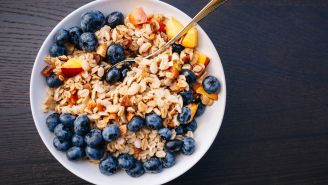Photo Credit: Amanda Mathson, via http://amandamathson.co/
Are you one of the 87% of Americans who reach for a morning cup of joe or tea to jumpstart your day?
After water, coffee is the most widely consumed beverage in the world, and it is the primary source of caffeine for adults, with tea coming in a close second.
Coffee and tea are considered the largest sources of antioxidants worldwide, and there is significant research revealing their health benefits. Both coffee and tea contain substances that can protect against disease. Polyphenols, for example, play an important role in the prevention of degenerative diseases, particularly cardiovascular diseases, diabetes and cancers.
Coffee shares almost the same protective benefits as cocoa and green tea because of its high concentration of polyphenols.
In 2001, scientists at the Nestle Research Institute conducted a study of coffee and other caffeinated substances. The study showed that coffee has even more antioxidant potential than green tea. Yet a 2014 study by chemists at the University of Belgrade that examined the protective effects of polyphenols on cancer found that coffee comes in second to green tea.
Not only do these substances have an antioxidant effect, but they also have been shown to inhibit growth of tumor cells and hinder disease-causing bacteria.
The majority of evidence on the protective benefits of coffee for cardiovascular disease, stroke, hypertension, type 2 diabetes and certain cancers comes from epidemiological research. Randomized controlled trials have studied the effects of caffeine and coffee on cardiovascular disease and risk factors such as blood pressure, cholesterol, and blood glucose/insulin sensitivity. Overall, the studies showed a neutral or inverse association between moderate coffee consumption and cardiovascular disease and risk factors such as blood pressure. A meta-analysis examining the effect of coffee consumption on serum cholesterol concentrations concluded that an increase in concentrations of total cholesterol and low-density lipoprotein cholesterol (“the bad” cholesterol) was greater for unfiltered than filtered coffee, whereas the consumption of filtered coffee resulted in very little change in serum cholesterol. Drip brewing or pour-over are methods that involve pouring water over the ground coffee; unfiltered coffee is when the coffee grounds are in contact with water for a longer time, such as coffee made in a French press.
The science behind the buzz
Caffeine is a naturally occurring substance found in plants such as coffee beans, tea leaves, kola nuts, guarana and cacao pods. The most common caffeine consumption is from coffee, black tea, soda and chocolate. Caffeine can be synthetically manufactured and added to drinks, food, sports-performance products, and medications.
Caffeine excites your body’s central nervous system, triggering a cascade of reactions that prompt the fight or flight response. Heart rate and blood pressure increase, blood flow is shunted away from the stomach for digestion to muscles for action and gastric secretions increase, which may trigger heartburn and reflux in some individuals. Stress hormones are released to initiate action and alertness.
When this fight or flight response is chronically activated with regular caffeine consumption, your system can burn out, which in turn affects adrenal glands by making their receptors less effective. This response can cause your body to demand higher levels of caffeine to produce the same effect of alertness, energy and pleasure. Just 100 mg a day can lead to physical dependence and cause withdrawal in its absence. Once you develop a tolerance, caffeine can be habit forming. Many of us are too familiar with the effects of stopping caffeine for even a day. Withdrawal symptoms include headaches, difficulty with concentration and sleep and muscle pain in the stomach and joints.
Caffeine and your heart health
The 2015 Dietary Guidelines Advisory Committee concluded that moderate coffee consumption (three to five cups daily or up to 400 mg/d caffeine) is not associated with increased risk for major chronic diseases, such as cardiovascular disease. The committee’s scientific report says that moderate coffee consumption, along with other positive health behaviors, can be incorporated into a healthy lifestyle. The American Heart Association has confirmed that drinking one to two cups of coffee per day does not appear to be harmful.
Caffeine and cognitive health
There is some evidence that caffeine has a positive effect on cognitive health. A 2010 study demonstrated the protective effects of caffeine on neurodegenerative diseases such as Parkinson’s and Alzheimer’s diseases and dementia. Another study by researchers at the University of South Florida showed that high levels of caffeine in the blood were connected to slowing down the progression of dementia.
Finding balance without stimulants
Ornish Lifestyle Medicine encourages reducing your exposure to stimulants (both physical and mental) to create a more balanced and mindful way of living. The four-element approach provides the nourishment your body truly needs. This includes low-fat, nutrient-dense, whole-food, plant-based nutrition; regular exercise with natural stress management practices such as mediation and restorative yoga; and a base for developing healthy relationships and support. When you are well nourished with a healthy lifestyle, you don’t need to rely on stimulants for a quick fix. Instead you experience a state of balance with sustainable energy that promotes lasting vitality. You’ll have a longer “fuse” even in the midst of stress.
The whole-food, low-fat, plant-based lifestyle approach of Ornish Lifestyle Medicine eliminates many factors that deplete our energy such as simple and refined carbohydrates, processed foods, high-fat foods and meat (think of how tired you are after a large high-fat meal such as Thanksgiving, a steak dinner or a processed, high-fat lunch). Other lifestyle factors such as stress, isolation and a sedentary lifestyle also rob us of our energy.
Up to one cup of coffee
Ornish Lifestyle Medicine now allows for limited amounts of caffeine with the choice of up to one cup of coffee (or two cups of decaf, or one ounce of espresso). This includes those who are currently drinking coffee, are not sensitive to caffeine, and have a history of tolerating caffeine well. This inclusion of a limited amount of caffeine also includes the option for up to two cups of green or black tea. Green tea is the preferred choice because it has the highest concentration of polyphenols, and has a positive effect on cardiovascular disease.
When you should avoid caffeine
Caffeine should be avoided if you’re sensitive to caffeine, have a history of high blood pressure, anxiety, or arrhythmias, insomnia or gastroesophageal reflux; if you’re taking certain medications; and if indicated by your healthcare provider. It is important to discuss your caffeine intake with your physician.
Have you tried eliminating caffeine from your diet?
Looking for other ways to live a healthier, happier life? Reverse heart disease and diabetes, lose weight and reduce your cancer risk with these tips from Dean Ornish.
This content originally appeared on Ornish Living.






